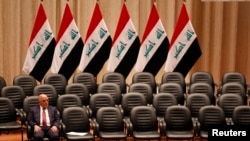Iraq's parliament approved a partial Cabinet reshuffle on Monday, part of a set of reforms proposed by Prime Minister Haider al-Abadi that has been stymied by entrenched political blocs.
The lawmakers endorsed nominees to head five ministries: oil, water resources, higher education, transportation, and housing and construction, parliament spokesman Emad al-Khafaji said, adding that the new ministers have been sworn in. He said lawmakers rejected a sixth nominee, for the trade portfolio.
"All the nominees are independent technocrats, specialists, and have experience in the fields they were chosen for,'' government spokesman Saad al-Hadithi told The Associated Press. "Today's move will improve government performance.''
Shortly after taking office in 2014, al-Abadi proposed reforms to combat corruption, cut government spending and merge ministries. He had hoped to replace political appointees with independent technocrats who could improve public services, which rapidly deteriorated following the 2003 U.S.-led invasion.
In late April, parliament endorsed nominees for six ministries during a raucous session, with dozens of lawmakers trying to halt the vote. Iraq's Supreme Court invalidated that session in June, effectively nixing the appointments.
The government has come under mounting pressure over the past year, with massive protests in Baghdad demanding the overhaul of the political system put in place after 2003, which has failed to improve basic services like water and electricity despite the country's oil wealth.
In April, thousands of supporters of Shiite cleric Muqtada al-Sadr broke into Baghdad's heavily guarded Green Zone, which houses parliament and several foreign embassies.
The political crisis has unfolded as the government struggles with dwindling revenues because of low oil prices. It is also at war with the Islamic State group, which controls Iraq's second largest city, Mosul.
Iraqi Kurdish forces said they drove IS out of 12 villages near Mosul on Monday, part of clearing operations ahead of an eventual push to retake the city.
Lt. Col. Arshad Hussein, stationed at a small outpost near the front lines, said Kurdish forces have pushed IS back more than 20 kilometers (12 miles) and captured a bridge southeast of Mosul. The U.S.-led coalition has been launching airstrikes to aid the Kurdish advance.
Iraqi leaders say the operation to retake Mosul will begin later this year.
Iraq's Parliament Approves Partial Cabinet Reshuffle

BAGHDAD —










